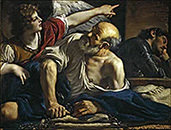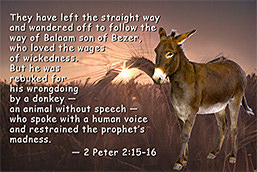
by Warren Camp
2 Peter 2:10b–16 . . .
“The Ungodly Are Reserved for Judgment”
First Peter is a book of comfort while Second Peter is a book that disturbs the soul. While the first chapter of 2nd Peter begins on a very positive note in which Peter stresses the sovereignty of God and the sufficiency of his provisions for life and godliness, in chapter 2, he turns from the truth to that which is false. He contrasts the true prophets and their prophecies with the false prophets of old and their successors, the false teachers who can be found within the church. They’ll exploit the saints (2:3), live in and promote sensuality, and find many followers who are attracted by the schemes of the flesh. Their teaching and practice are heretical. In vv. 4–10a (highlighted in Warren’s commentary on 2:1–10a), Peter turns back in time to similar situations in ancient history (namely the flood of Noah’s day and the destruction of Sodom and Gomorrah in Lot’s day) to show that God knows how to deliver the righteous from temptation and the wicked to eternal punishment.
Having assured his readers in vv. 4–10 of the certainty of deliverance and destruction, Peter now provides us with a striking description of these false teachers. He reveals their true character and conduct while comparing them to Balaam, an Old Testament prototype “who loved the wages of wickedness” (vv. 15 and 16). And, we’ll soon see Peter describe them in terms of their destructive impact on all who follow them (vv. 17–22).
Warning! Today’s passage is vigorous and vindictive. It may contain the most vicious language in the New Testament.
False Teachers: Boldly Arrogant and Defiant (2:10b–11)
10bBold and arrogant, they are not afraid to heap abuse on celestial beings; 11yet even angels, although they are stronger and more powerful, do not heap abuse on such beings when bringing judgment on them from the Lord (2 Pet. 2:10b–11 NIV).
Peter is writing against false teachers who’d crept into the churches of Asia Minor and who were leading many young, weak Christians astray. These ungodly teachers are especially reserved for judgment. They live according to the flesh, not the Spirit, and are marked by unrighteousness. In chapter two, Peter has already begun to point out that these false teachers were setting forth a type of Christian-Gnosticism, which is a blend of a bit of Christian truth with a lot of philosophical error.
In v. 10a, Peter said that false teachers “follow the corrupt desire of the flesh and despise authority.” Now in v. 10b, he picks up on their sinister character by saying they are “bold and arrogant” — presumptuous, audacious, proud, headstrong, self-pleasing, contemptuous of other people, with a reckless courage that defies God and man.
Verse 11 is Peter’s loudmouthed, blasphemous tirade against all that’s high, honorable, or holy, “even angels.” Here he contrasts the behavior of those who live according to the flesh with faithful angels who never slander or exaggerate what they say or how they represent people’s sins. Bold, arrogant, false teachers were speaking disrespectfully of angelic beings. Peter tells us that these false teachers were so rebellious, so self-willed, that they stepped in, bringing critical accusations against church leaders. He says in v. 11 that the holy angels (in contrast to the false teachers) never bring a reviling judgment against fallen angels; instead, they’d rather turn over judgment to the Lord. These men arrogantly pontificated on spiritual matters but didn’t humbly submit to God’s Word or fear him.
False Teachers: Full of Lust and Greed (vv. 12–16)
Peter will now further his indictment of false teachers among the people of the church, describing both their reckless sins before God and the consequences those sins will cause for them. In vv. 12–16, we see Peter highlighting the depravity, deception, and destruction of false teachers. He’s revealed that these false teachers were, apparently, insulting or mocking celestial beings as part of their teaching. He calls that blasphemy: speaking without proper reverence about sacred things. We don't know what they were saying specifically, or why they were saying it, but Peter makes it clear that they didn’t know what they were talking about. For this reason, he compares false teachers to animals driven only by instinct, not rational thought.
12But these people blaspheme in matters they do not understand. They are like unreasoning animals, creatures of instinct, born only to be caught and destroyed, and like animals they too will perish. 13They will be paid back with harm for the harm they have done. Their idea of pleasure is to carouse in broad daylight. They are blots and blemishes, reveling in their pleasures while they feast with you in their love feasts. 14With eyes full of adultery, they never stop sinning; they seduce the unstable; they are experts in greed — an accursed brood! 15They have left the straight way and wandered off to follow the way of Balaam son of Beor, who loved the wages of wickedness. 16But he was rebuked for his wrongdoing by a donkey — an animal without speech — who spoke with a human voice and restrained the prophet’s madness (2 Pet. 2:12–16).
Pastor/teacher Bob Deffinbaugh summarizes this five-verse passage well: “The root malady of these spiritual charlatans is that they are dominated by the flesh, enslaved by its corrupt desires and impulses (2:19–20). Driven by impulse and instinct, they hardly differ from animals (v. 12). They sin persistently — non-stop (v. 14). They are so deeply enslaved to sin that they no longer know any shame. Rather than carry out their fleshly desires in private, they find pleasure when they sin in public (v. 13). The inference of the text is that some of the fleshly indulgence practiced by these pseudo-Christians is carried out publicly in the church gathering (v. 13), even at the Lord’s Supper (Jude 12).”[1]
Starting in v. 12, Peter accentuated a false teacher’s pride. Primarily, false teachers, similar to cult leaders, claim to be very smart and wise. They talk about stuff they don’t know anything about and boast loudly. With whatever knowledge they have or think they have, they inflate their egos unjustly while demanding outright obedience. Evil teachers, through fraud, violence, lust, and deceit establish the very type of social climate that inevitably encompasses their own destruction, as well as that of their victims.
False teachers “are like unreasoning animals” (v. 12) because they function in the flesh, not the Spirit. Peter means that these men have abandoned their God-given rational ability as they follow their lusts as animals do. They were controlled by their feelings, not by reason confirmed by God’s Word of truth. Fit only for destruction, “born only to be caught and destroyed,” they’re ignorant; they’ll undoubtedly receive the wages of unrighteousness. The ungodly will be “paid back with harm for the harm they have done” (v. 13). The point: False teachers face God’s eternal judgment because they’ve lived like a bunch of animals, following their lusts.
Peter further describes the lusts of these false teachers in v. 13b: “Their idea of pleasure is to carouse in broad daylight.” Most people who sin do so at night, so their evil deeds may be hidden by darkness (1 Thessalonians 5:7). But these evil teachers threw off all restraints; they partied all day long! If they’d lived in our day, they’d be on daytime television talk shows, excitedly telling lurid details about their sins. Peter also exposes false teachers’ lust by picturing them in v. 14 “with eyes full of adultery, they never stop sinning; they seduce the unstable.” The word “adultery” literally references “an adulteress.” The idea is that these false teachers looked at every woman as a potential candidate with which to go to bed. They preyed on unstable souls, those who were newer, professing Christians who were emotionally and spiritually shaky. What Peter is saying here is very clear: Do not merely look at a teacher’s words, or clothes, or smile, but pay attention to his or her lifestyle!
At the close of v. 14, Peter highlights the identifying mark of false teachers: greed. He says, “they are experts in greed — an accursed brood!” These false teachers and their followers are children of a curse. They’re under the judgment of Almighty God and his eternal curse. Then in v. 15, we learn from Peter that these false teachers followed the flesh, not Christ, whose way is straight and narrow and leads to eternal life. However, the false teachers “have left the straight way and wandered off.” Their chosen way is broad and it leads to destruction.
Peter astutely uses the example of Balaam the prophet. (Read his story: Numbers 22.) Balaam wasn’t only guilty of extensive greed as a false prophet, he also led the children of Israel into immorality (Num. 22:25, 31). He prostituted his high office for money. Incidentally, Balaam’s Hebrew name means “destroyer of the people.” The elders of Moab offered handsome divination fees to Balaam, which he should have refused but didn’t. The Moabites wanted to hire Balaam to speak a curse against God’s people. Yet, he didn’t refuse them because he wanted money, hoping that God would change his mind so he could get paid. Sadly, Balaam the prophet’s number one priority was money. Peter warns his readers — us — about false teachers. Similar to televangelists Jimmy Bakker (who covered up an alleged rape of his secretary with hush money) and Jimmy Swagert (who’d been accused of visiting prostitutes), they all look to profit and get rich from the gospel.
Balaam had an encounter with God who spoke to him through a dumb donkey. So preoccupied with money, Balaam couldn’t see the angel of the Lord in front of him. Peter presents to us a clear incident where the prophet was dumber than his donkey. He was so crazed that he carried on a conversation with a donkey and wasn’t fazed by it. Balaam’s sin was to compromise truth while having a strong conviction for money.
Greed and immorality characterized Balaam’s drive. Similarly, greed and immorality captured the thinking of the false teachers about whom Peter has written. We know that Balaam was judged by the Lord (Num. 31:8). So, too, the false teachers will be judged. And, they’ll be judged without receiving God’s mercy.
Closing Considerations from Dr. Charles Stanley
God warns us against misguided desires because sinful passions can lead to emptiness, suffering, disappointment, pain, even death. Wise believers let the Father direct their yearnings, and they adjust their mindset accordingly.
Impure desires, which have been part of the “flesh” since the fall of man, can be hard to recognize in ourselves. Instead of relating to obvious things like theft, drugs, or immorality, they often involve more subtle attitudes and behaviors, like hoping for a rival’s downfall, despising authority (v. 10), and obsessing about wealth (1 Timothy 6:9). But we can’t overcome these desires on our own. Submitting to God’s Spirit is the only way to live righteously.
The Lord knows what we desire — and more importantly, what we need — even when our cloudy judgment leads us astray. God can save us from worldly desires. But we must be willing to commit ourselves to Him, trusting that His response is the best thing for us. When we put our life entirely in the Father’s hands, we can claim the wonderful promises He has for us, then rest in His grace.[2]
- Q. 1 If it’s plain that judgment awaits these false teachers, why did anyone follow them?
- Q. 2 In what way(s) are false teachers similar to Balaam?
- Q. 3 Who are the gross sinners in vv. 13–16? What are they like?
- Q. 4 On what basis is Peter assured that they will be paid back in kind?

‘Saint Peter Freed by an Angel’
Click to open “Peter Masterpieces.”
Summary Video: “Second Peter”
† Watch this overview video of Second Peter created by BibleProject.
Warren’s New “Peter Masterpieces” Photo Album
† View several classic paintings of Saint Peter by art world masters: Rembrandt, Michelangelo, Da Vinci, Rubens, Goya, El Greco, Raphael, Masaccio, Giotto, Correggio, Tintoretto, Caravaggio, Veneziano, Tissot, Duccio, Fra Angelico, Galle, Duccio, Dürer, Palomino, and many more.
2 Peter 2:10b–16
New International Version (NIV) or view it in a different version by clicking here.
— Listen to chapter 2, narrated by Max McLean.


